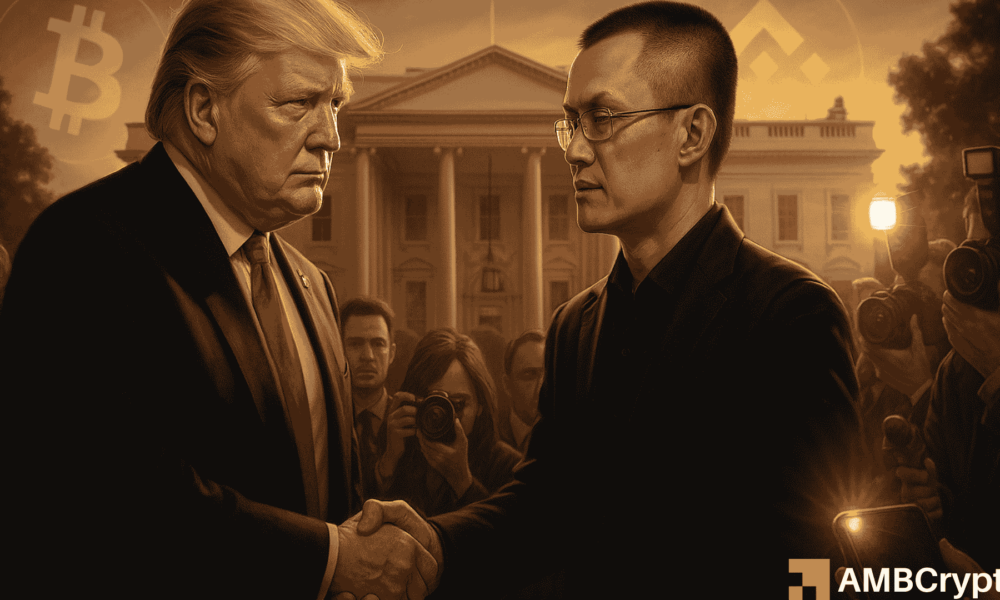Key Takeaways
Why is Trump’s CZ pardon controversial?
President Donald Trump’s decision to pardon Binance founder Changpeng “CZ” Zhao has sparked accusations of “pay-for-crime”.
What does it mean for crypto and politics?
The move deepens Trump’s reputation as a pro-crypto candidate but raises new ethical questions.
President Donald Trump’s decision to pardon Binance founder Changpeng “CZ” Zhao has triggered widespread backlash.
Critics are accusing him of “selling justice” and using presidential clemency to reward political and financial allies in the crypto industry.
Binance founder’s pardon kicks up dust
The pardon, announced on 23 October, wipes CZ’s 2023 conviction for Bank Secrecy Act violations. The case centered on Binance’s alleged role in facilitating transactions for sanctioned entities through its platform.
CZ had served a four-month prison term and was barred from holding executive positions within Binance.
Trump’s pardon clears those restrictions, allowing CZ to return to U.S. business and reclaim a leadership or advisory role at the world’s largest cryptocurrency exchange.
Allegations of political favoritism
Critics allege that the pardon may not have been an act of leniency but one of political reward.
Blockchain researcher Adam Cochran was among the first to label the move “disgusting,” accusing Trump of “legalizing crime for those who can pay.”


Source: X
Cochran claimed that Binance, under Zhao’s direction, had “knowingly allowed groups like Hamas and Wagner to use its exchange” — and later partnered with Trump-linked entities before the pardon.
He cited Binance’s association with World Liberty Financial, a venture connected to Trump’s political circle, and Dominari Holdings, a firm tied to Trump’s family and headquartered in Trump Tower.
According to Cochran, Binance also invested in related projects through YZi Labs, a restructured version of Binance’s former venture arm, prior to Zhao receiving his pardon.
“This is the clearest case yet of pay-for-crime,” Cochran wrote on X. “Trump has made clear that crime is legal in America as long as you can pay him enough.”
Other social media users claimed that Binance coordinated large market sell-offs earlier this month to profit insiders linked to Trump. They alleged this was a “deal” that secured Zhao’s pardon. These claims remain unverified.
No official response
Neither the Trump campaign nor Binance has issued a public statement addressing the allegations.
Trump’s prior remarks on crypto policy have emphasized his intent to “restore innovation and leadership in American blockchain technology.”
The message aligns with his recent pardons for high-profile figures in the sector, including Ross Ulbricht.
Additionally, the DOJ has recently reached an agreement with Roger Ver regarding a crypto tax lawsuit.
BNB rebounds amid controversy
Despite the uproar, Binance Coin [BNB] surged more than 4% to trade around $1,142 at press time, according to TradingView data.


Source: TradingView
The token’s Accumulation/Distribution (A/D) indicator showed renewed buying activity, suggesting investors viewed the news as a net positive for Binance’s future.
If momentum continues, analysts expect BNB could challenge resistance near $1,200, a level last reached in early October before the recent market correction.
A political and market flashpoint
Trump’s decision to pardon Zhao highlights his administration’s growing alignment with the crypto sector. This stance sharply contrasts with the tougher regulatory posture under previous leadership.
However, the accusations of “pay-for-crime” have opened a new front in the debate over the intersection of money, politics, and digital assets.
For critics, the CZ pardon marks a troubling moment where presidential power and crypto influence may have collided.







